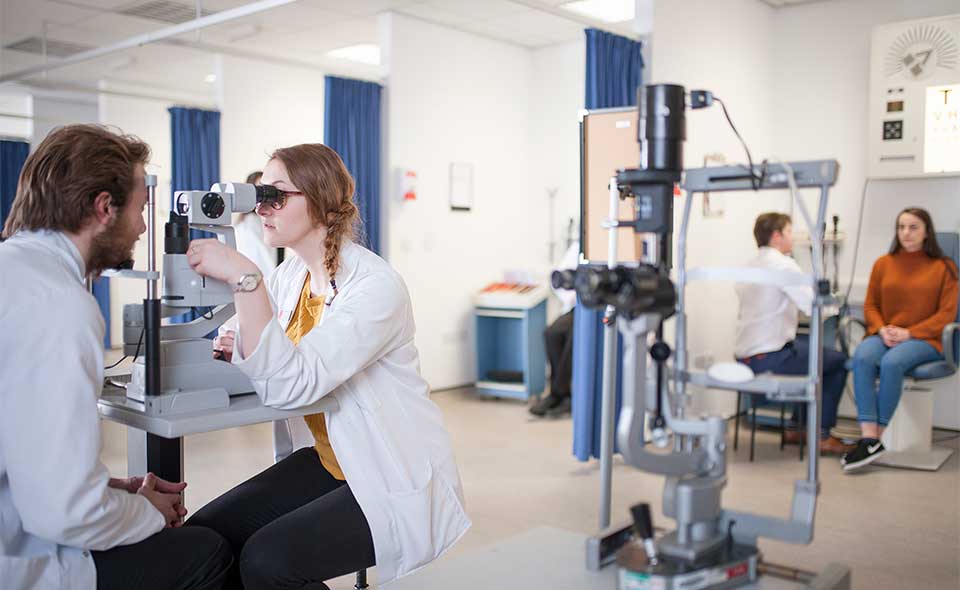- OT
- Professional support
- Optical organisations
- Equipping the future of optometry
Equipping the future of optometry
OT explores how universities have developed their course offering by responding to changes in the profession and how they are preparing students for future practise

17 July 2018
Embarking on a university degree marks the first steps towards becoming a qualified professional. Preparation for working life starts from day one and the course content helps define what route students take upon graduation.
For AOP student representative at Aston University, Shoaib Ilyas (pictured below), multiple practice presents an opportunity to further develop his skillset.
“Although there are many benefits to working in an independent, I feel that in the early stages of my career, I can benefit from the courses provided and extensive support packages provided by some multiples,” Mr Ilyas shared.
He believes that the course at Aston has allowed students to explore all options, rather than only highlighting certain career paths.
“Our lecturers and supervisors take their job seriously, ensuring that we will be clinically competent before anything else. But on top of this, we know they can offer career advice and we can access resources, such as those from the AOP, to read in to different paths and sectors,” Mr Ilyas added.
The AOP’s student representative at City, University of London, Zaman Sachedina, plans to work in the hospital eye service or at a multiple in the UK before seeking accreditation in Canada.
“It has always been my dream to own my own practice and provide the best quality of health care possible,” he shared with OT.
Mr Sachdina explained that although the process to achieving accreditation in Canada will be lengthy, he believes his university course is preparing him with the best training and advice to accomplish his goals.
“I have no doubt that after completion of my programme, I will be prepared to pursue any route within optics,” he said.

Knowledge, skills and behaviour
There are currently 11 universities in the UK offering an optometry course and this will increase in September to 12, so how are these institutions helping students achieve their dreams and preparing them for the future of optics?
The University of Plymouth’s three-year degree programme incorporates the College of Optometrists’ Scheme for Registration.
Lecturer and admissions tutor in optometry, Nicola Szostek, told OT: “In comparison to other approaches, we feel that it is best equipped to provide the high volume of varied clinical experience that optometry graduates need to become well-rounded optometrists.”
The lecturer explained that the university offers a dynamic course that can quickly respond to changes in the industry, such as embedding the latest diagnostic imaging in the programme from the first year of study.
In order to incorporate inter-disciplinary learning across all three years of the optometry course at Plymouth, a complete overhaul of the module structures has taken place.
“This not only provides our students with an awareness of the work that other health care professionals do, but also ingrains the need to take a holistic view of patients with complex health needs,” Ms Szostek explained.
She also shared that the module re-structure has provided greater opportunities for students to undertake business and management training.
Additionally, Plymouth’s optometry course leaders have responded to the increasing number of shared care schemes being established in the UK by ensuring that its students are involved in as many specialist shared care clinics in Devon as possible.
At Cardiff University, a three-year BSc in optometry and a four-year BSc in optometry with a preliminary year are available alongside its post-graduate qualification offering. The course is designed to prepare students for the pre-reg year or to undertake post-graduate study through research-led teaching, with an emphasis on clinical skills and access to a purpose-built student clinic.
Head of the school of optometry and vision sciences, Professor Marcela Votruba, explained: “When combined with the enormous range of bespoke post-graduate options, Cardiff University graduates are equipped with the ability to be adaptable to local clinical needs and to develop their own passions as clinical specialists.”
Ms Votruba said that over the last 10 years, the development of a post-graduate offering has been the university’s main change. Initially, it provided minor eye conditions services/primary eyecare assessment and referral service and glaucoma training in Wales and then the UK. “Currently, we offer six post-graduate qualifications in clinical optometry, glaucoma, therapeutic prescribing and eye care governance as well as seven higher professional qualifications that are accredited by the College of Optometrists,” she shared.
"When combined with the enormous range of bespoke post-graduate options, Cardiff University graduates are equipped with the ability to be adaptable to local clinical needs and to develop their own passions as clinical specialists"
A total of 30 students will start the new optometry BSc in September at the University of the West of England (UWE).
“The course is designed to provide students with the knowledge, skills and behaviours to ensure they are future facing,” according to programme leader in optometry, Dr Rebekah Stevens.
In recognition of the increasing scope of practice that optometrists need to be prepared for, the new course will include a business module, created in partnership with the university’s business school, that will specifically teach students about how to start and grow an optical business.
Dr Stevens added: “We have included two ‘elective’ modules which allows the students to choose one to ‘specialise’ in, which typically mirrors the College of Optometrists’ professional certificate in medical retina or glaucoma, thus empowering students to think about specialisms and completing these higher qualifications after their pre-registration period.”
The BSc and MSci optometry courses at the University of Manchester have been developed to encourage students to think about new technology in optometry, what it means to be a professional and an introduction to completing reflective exercises after seeing a patient.
Senior lecturer Will Holmes explained that all students get the chance to gain clinical experience at the university’s in-house primary eye care clinic and through placements at Manchester Royal Eye Hospital.
“Six or seven years ago, we changed the ratio of supervisors to students to 1:2 in our final year primary eye care clinic, which is where they get most of their experience,” Mr Holmes said.
He said that undergoing changes to health and social care in Manchester, which includes budget powers being devolved to Manchester City Council, also present an opportunity to develop the university’s offering.
“The University of Manchester is increasingly looking to work with people who are leading in the optometric and primary care side to see how that might affect students that graduate from our course as well as the services that are going to be provided and how we can make our students ready for that particular environment if they choose to stay in Manchester,” he shared.

Flexible learning
Ms Votruba explained to OT that the General Optical Council’s (GOC) Education Strategic Review (ESR) is an incredibly exciting opportunity to ensure that future Cardiff graduates are suitably equipped to play a lead role in the diagnosis and management of a wider range of eye conditions.
“This could include adapting our curriculum to include the range of core teaching that is presently taught at postgraduate level. In addition to gaining experience in our own specialist teaching clinics, we are hoping to expand external placements to include a wider range of clinical settings such as community practice and hospitals,” she shared.
Mr Holmes told OT that the University of Manchester had been progressively making many of the proposed ESR changes before they were announced, but he hopes that it will allow for more flexibility in learning.
“At the moment it’s an input-based criteria for courses, so our students have to see 18 real patients of this and 12 real patients of that, and so on. We hope those inputs will be relaxed and we’ll be able to select appropriate teaching tools to achieve the learning outcomes that the GOC specify,” he said.
The lecturer added that he hopes that basic science, such as anatomy and physiology, as well as mathematics and statistics, will not be lost as new technologies, such as optical coherence tomography, require “a more back to basics approach.”
“We’re very firm in our belief at Manchester that the basics of science and mathematics continue to be taught in order to produce clinicians who understand what’s going on rather than just interact with what’s produced,” Mr Holmes said.
Independent prescribing
When it comes to adding independent prescribing qualifications, both Dr Stevens and Mr Holmes believe that it is not possible in the current undergraduate programme.
Ms Stevens explained that post-qualifying experience is necessary prior to starting the independent prescribing qualification but added that the new UWE course prepares students should they go on to complete it.
“We have incorporated two pharmacology and therapeutics modules to give our students the fundamental theory about prescribing, and by offering the choice of two optional advanced modules in the final year, we are preparing our final year undergraduates to make advanced clinical decision-making skills,” Ms Stevens shared.
Mr Holmes added that any course looking to provide independent prescribing qualifications would need to extend its programme “significantly.”

Comments (1)
You must be logged in to join the discussion. Log in
Prab Boparai23 July 2018
While it is good to include the learning of the latest diagnostic tools, I think it is crucial that universities teach the art of using the basic tools such as contact tonometry (GAT) and indirect ophthalmoscopy (Volk +) to a MUCH HIGHER standard than is currently done. They exhaust the direct ophthalmoscope training but the indirect training is brief. Such proficiently trained optometrists will help to reduce the inappropriate referrals going to the overburdened hospital eye service and be better skilled for the enhanced community eye services.
Report Like 253